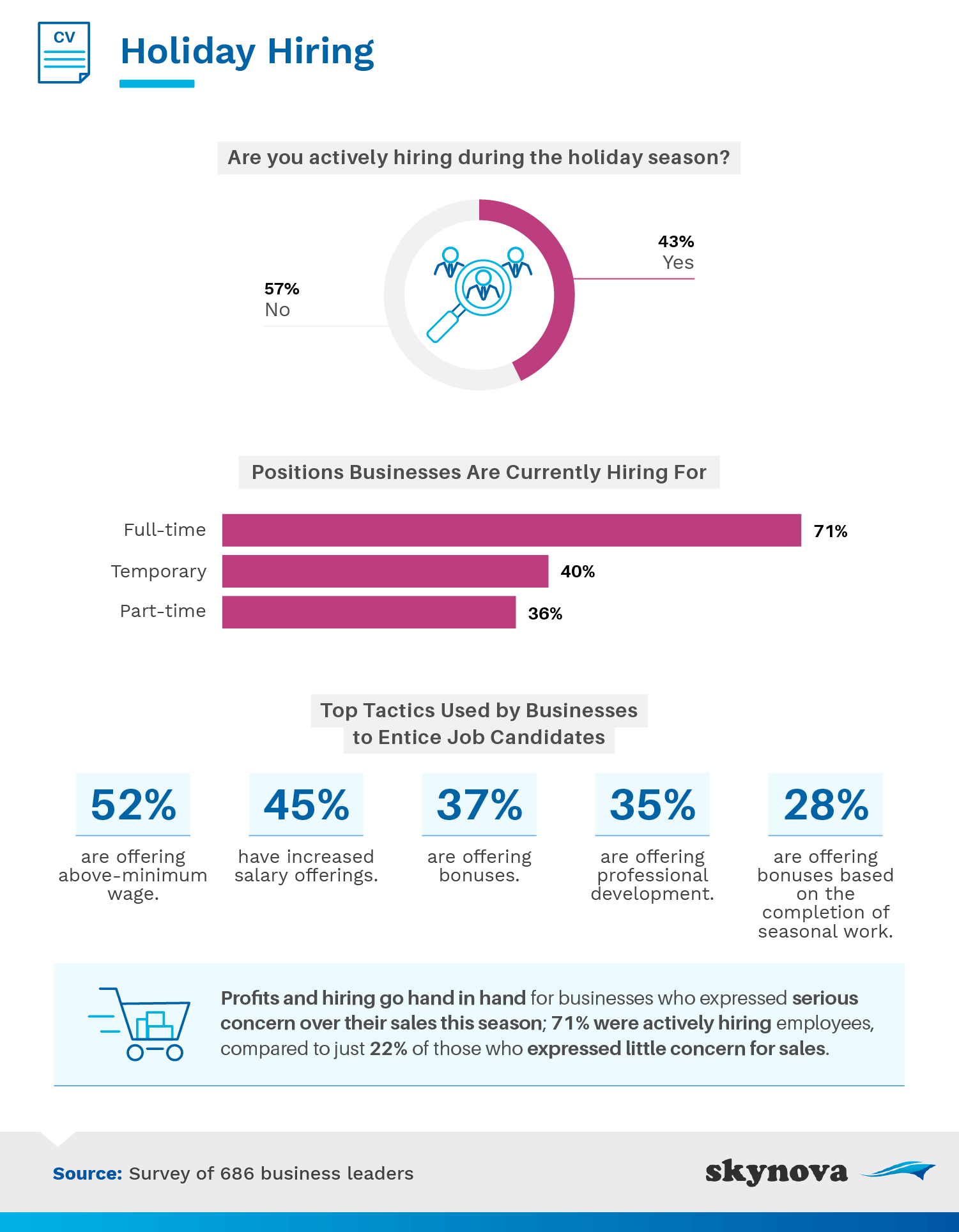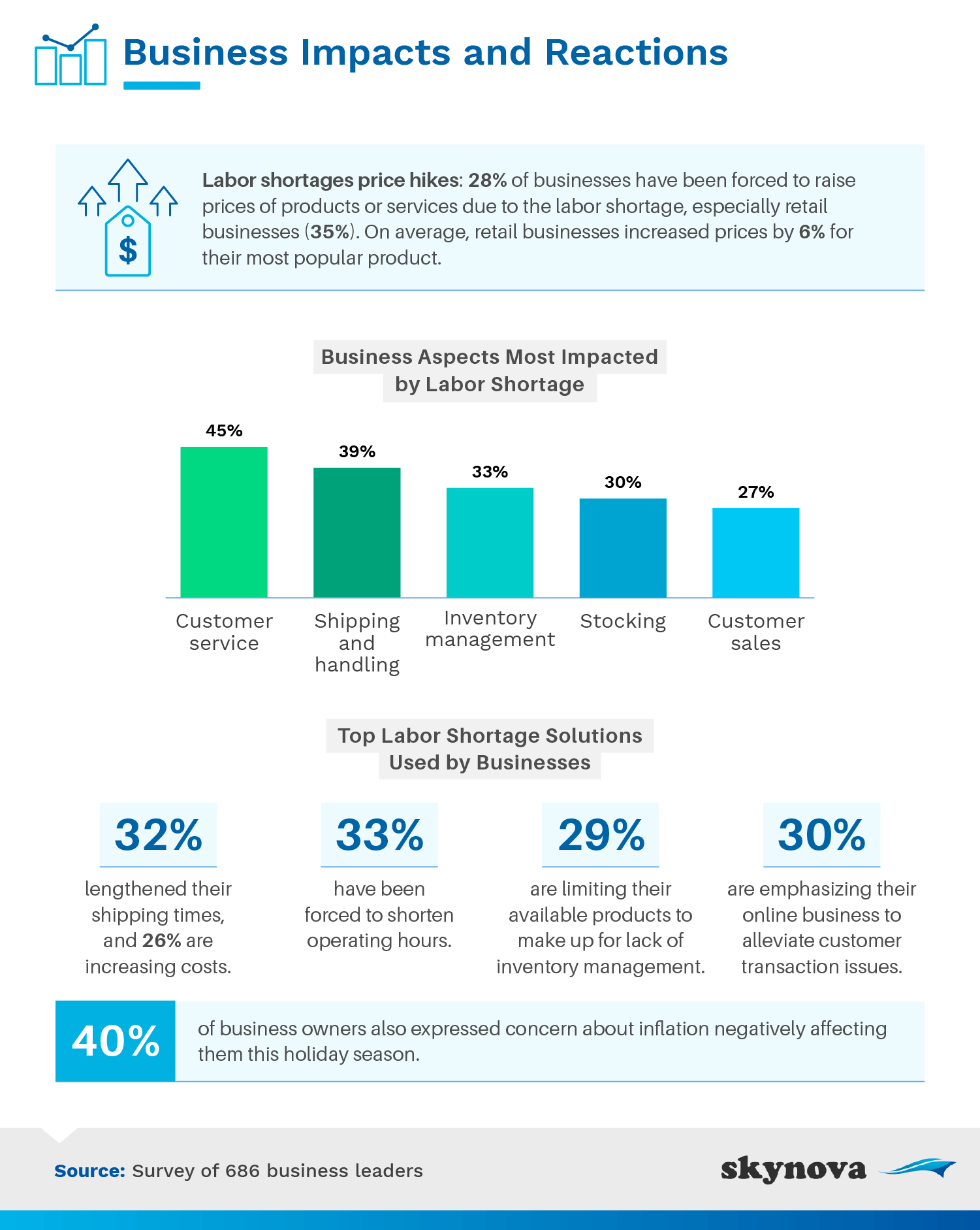
|
The typical bustle of the holidays may look different this year, with so many in need of hired hands to get them through the 2021 season. The labor shortage isn’t just responsible for Santa shortages, sparse product inventories, and increasing sales concerns among business owners, it could also be responsible for even more expensive products and services due to many business owners raising prices this season.
| 33% of businesses said employees quit before the holidays, causing a holiday hiring scramble. |
In order to fully explore the impacts the shortage is having on businesses, we surveyed nearly 700 business owners and decision-makers and asked them to weigh in on their current efforts to deal with the lack of help in time for December and beyond.
Around 1 in 3 of the businesses we surveyed reported employee resignations ahead of the holiday, leaving around 43% of business owners scrambling to hire staff. But businesses aren’t just hiring for seasonal, temporary workers. The majority of business leaders said they’re looking for full-time employees, and they’re offering higher than typical pay in order to attract full-time team members to join them.

Raising wages seems to be a common strategy among business owners in order to compete in the job market today, even if it comes at the cost of biting into company profits. Business owners seem to have justified this risk, however, as our survey results found that worry over a loss in sales seemed to be related to an urgent need to hire employees. Other strategies include offering bonuses, professional development, and seasonal bonuses (likely for temporary employees needed to fill holiday shifts this year).
It’s hard to imagine that such disruption caused by the labor shortage could miss the consumer. On top of a shortage of workers, businesses are also concerned about inflation and the labor shortage’s interruption of typical supply chain transactions. Delays in receiving goods from suppliers may also mean a delay to the customer exacerbated by not having enough hands to manage business transactions, such as customer service and shipping and handling. For customers, this could mean longer shipping and delivery times as well as higher shipping costs.

Nearly 1 in 3 business owners have reacted to recent hiring struggles by raising the prices of their products or services by an average 6%. By limiting their product or service offerings and emphasizing their online platforms and transactions, businesses may be able to shift away from needing in-store workers for customer service or sales transactions, as they may have typically done in the past.
We also asked if business owners used presales strategies such as off-season discounts, gift cards, or certificates and pre-ordering to stimulate their cash flow ahead of the holidays. Around 43% said they used these tactics, with over a third of them experiencing positive, measurable effects to their sales (35%). The labor shortage and supply chain disruption may be roadblocks for businesses this season, but for companies who have already had to adjust and successfully adapt to the conditions of the pandemic, these companies may prove resourceful and up to the task.
Skynova makes invoicing for small businesses easy and professional. Small-business owners can create and execute professional templates for invoices and explore our many software modules that help with tasks like tracking work orders to drafting business proposals with a competitive edge. Beyond providing useful tools, Skynova’s extensive research and data-backed findings are aimed at helping business owners navigate the ever-changing small-business landscape.
We surveyed 686 business owners, managers, and senior employees to understand the impacts of the labor shortage and hiring efforts ahead of the holidays. The margin of error for our sample size was +/- 4% with a 95% confidence level.
We first captured a general sample of business owners and business leaders, then we targeted those who had been impacted by the labor shortage in order to explore the impacts more deeply. We collected 350 respondents who reported being impacted. Our survey respondents ranged in age from 18 to 75 years old with a mean age of 37. 46% were men, 53% were women, and 1% identified as nonbinary. Around 75% of respondents were owners, and 25% identified as managers and senior employees. Around 63% of all those surveyed were from small businesses (less than 50 employees), 20% from midsize businesses (50 to 249 employees), and 17% from large businesses (250 employees or more).
Survey data has certain limitations related to self-reporting. These limitations include telescoping, exaggeration, and selective memory. We didn’t weight our data or statistically test our hypotheses. This was a purely exploratory project that examines the impacts of the labor shortage.
If your network would benefit from exploring this article on the current labor shortage, feel free to share for noncommercial purposes only. If you do, we request a link back to our study.